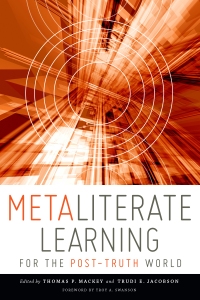
Metaliterate Learning for the Post-Truth World
Kimmika Williams-Witherspoon, an Associate Professor at Temple University offers the following preview of her chapter: “Poetic Ethnography and Metaliteracy: Empowering Voices in a Hybrid Theater Arts Course’ appearing in the forthcoming book, Metaliterate Learning for the Post-Truth World.
When is a Theater arts course more than a theater arts course? How do we encourage students to “have voice”? In an age when “alternative facts” have become the new norm, how can theater and the theater studies curriculum give students agency to contribute to the discourse? Well… at Temple University, these days, its when faculty consciously use a metaliteracy lens to develop or improve their courses so as to encourage students to not just consume new knowledge but also to produce it and to distribute it through multiple modalities and across multiple platforms.
At Temple University in Philadelphia, the Theater Studies curriculum exemplifies the metacognitive domain of metaliteracy teaching students to effectively consume and produce new information in the form of devised theater productions, displays, press releases, exhibitions, community performances and critiques. One such course that goes a long way to introduce metaliteracy concepts into the theater curriculum is THTR 2008 Poetic Ethnography.
The course, THTR 2008 Poetic Ethnography operates as both ethno-drama and as a theater hybrid that incorporates several tightly structured field site audio and video digital storytelling projects into its 13-week curriculum. These projects encourage students to expand their knowledge base, investigate multiple forms of information gathering methodologies and to develop performative and distributive content across multiple cultural and social platforms.
Through the process of research and new knowledge production, students gain life-long learning skills about how to develop more nuanced, personal narratives that tell a more complete and factual story about communities, individuals and contemporary events. This chapter, then, looks at how Poetic Ethnography teaches students how to develop ethnographic and personal narratives set to poetry about Philadelphia neighborhoods and its people—giving voice to the sometimes voiceless in our communities, while simultaneously learning metaliteracy and metacognitive learning strategies.
Dr. Kimmika L. H. Williams-Witherspoon, Associate Professor
Department of Theater
Temple University
